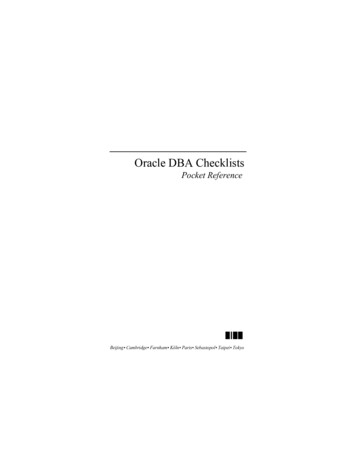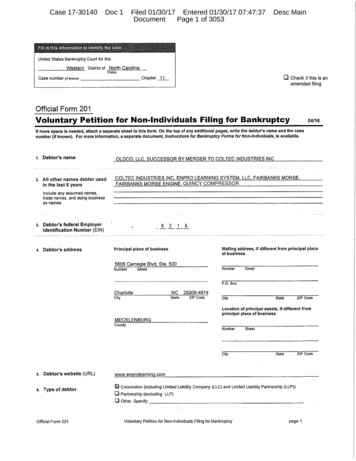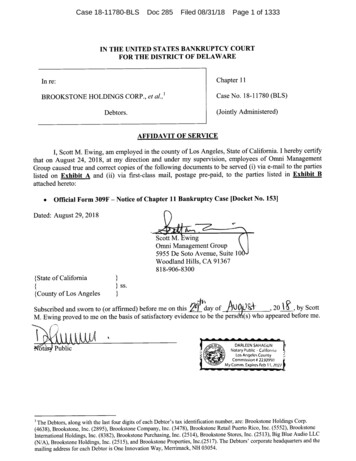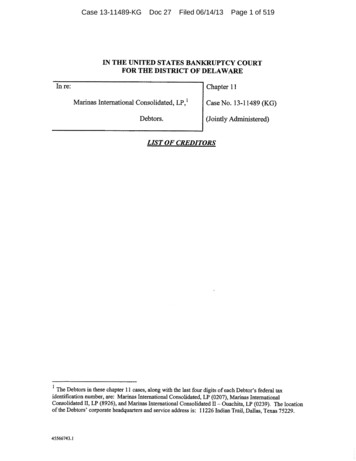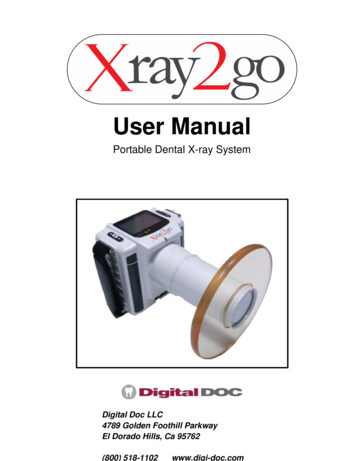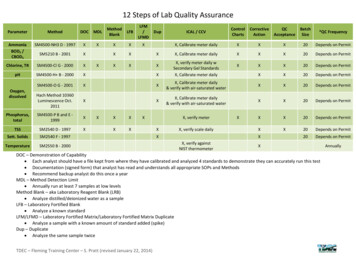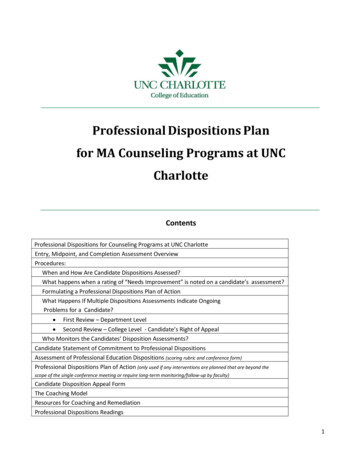
Transcription
Professional Dispositions Planfor MA Counseling Programs at UNCCharlotteContentsProfessional Dispositions for Counseling Programs at UNC CharlotteEntry, Midpoint, and Completion Assessment OverviewProcedures:When and How Are Candidate Dispositions Assessed?What happens when a rating of “Needs Improvement” is noted on a candidate’s assessment?Formulating a Professional Dispositions Plan of ActionWhat Happens If Multiple Dispositions Assessments Indicate OngoingProblems for a Candidate? First Review – Department Level Second Review – College Level - Candidate’s Right of AppealWho Monitors the Candidates’ Disposition Assessments?Candidate Statement of Commitment to Professional DispositionsAssessment of Professional Education Dispositions (scoring rubric and conference form)Professional Dispositions Plan of Action (only used if any interventions are planned that are beyond thescope of the single conference meeting or require long-term monitoring/follow-up by faculty)Candidate Disposition Appeal FormThe Coaching ModelResources for Coaching and RemediationProfessional Dispositions Readings1
Professional DispositionsFor Counseling Programs at UNC CharlotteThe College of Education, in collaboration with the Colleges of Liberal Arts and Sciences and Arts and Architecture, isresponsible for preparing candidates who have the required knowledge, skills, and professional dispositions to becomeeffective educators. Therefore, your chosen program of study will prepare you to develop and model the knowledge, skills,and dispositions expected of excellent professionals. Faculty and/or school personnel will evaluate your demonstration ofthese professional dispositions and provide you with feedback about your progress. Professional Dispositions include theattitudes, values, and beliefs demonstrated through both verbal and nonverbal behaviors as educators interact withstudents, families, colleagues, and communities. These positive behaviors support student learning and development. Theyinclude the ideal of fairness and the belief that all students can learn. The Code of Ethics for North Carolina Educators, theUNC Charlotte Code of Academic Integrity, and the College of Education’s Conceptual Framework more specificallyarticulate characteristics expected for all education professionals. Dispositions are assessed indirectly, based on candidates’observable behavior in educational settings (NCATE, 2008).MA StudentsPrimary Professional DispositionsProfessional EthicsProfessional BehaviorProfessional & Personal BoundariesKnowledge & Adherence to Site PoliciesRecord Keeping & Task CompletionMulticultural CompetenciesEmotional Stability & Self-controlMotivated to Learn & Grow / InitiativeOpenness to FeedbackFlexibility & AdaptabilityCongruence & GenuinenessSpecific Professional Disposition DescriptorsAdheres to the ethical guidelines of the ACA, ASCA,IAMFC, APA, & NBCC; including practices withincompetencies.Behaves in a professional manner towards supervisors,peers, & clients (includes appropriate dress &attitudes). Able to collaborate with others.Maintains appropriate boundaries with supervisors,peers, & clients.Demonstrates an understanding & appreciation for allcounseling site policies & procedures.Completes all weekly record keeping & tasks correctly &promptly (e.g., case notes, psychosocial reports,treatment plans, supervisory report).Demonstrates awareness, appreciation, & respect ofcultural difference (e.g., race, ethnicity, spirituality,sexual orientation, disability, SES, etc.)Demonstrates emotional stability (i.e., congruencebetween mood & affect) & self-control (i.e., impulsecontrol) in relationships with supervisor, peers, &clients.Demonstrates engagement in learning & developmentof his or her counseling competencies.Responds non-defensively & alters behavior inaccordance with supervisory feedback.Demonstrates ability to flex to changing circumstance,unexpected events, & new situations.Demonstrates ability to be present and “be true tooneself”Students are expected to disclose any unethical or unlawful activity from the time application was submitted into theprogram until the end of the program.2
Entry, Midpoint, and Completion Assessment OverviewDescription of Typical ActivitiesBy WhomMACounselingEntryEntry-Level Course Inform and teach professional dispositions duringorientation, advising, and/or seminar Overview of assessment procedures and documents Candidate self-assessmentProgramCoordinatorCSLG 6101CandidateMidpointMid-point Course Review of professional dispositions, procedures, anddocuments Candidate self-assessment Faculty assessment of candidate dispositions Application of dispositions in a professional setting Faculty initiated plan of action, with candidateinitiated actions (as needed)ProgramfacultyCandidateInstructorCSLG 7430InstructorOptionalCandidatesCSLG 7435 (1)AnytimeAny time:If concerns are identified during courses or clinicals, or asrequired by department Information discussed with the candidate Professional Disposition Plan of Action is initiated byfaculty member, in consultation with publicschool/agency representative when applicableExitExit: Candidate affirms commitment to dispositions3
Procedures – When and How Are Candidate Dispositions Assessed?Candidates are assessed on dispositions in one of two ways:1. Dispositions for MA candidates will be assessed at three points, referred to as "dispositional decisionpoints," within programs using the Assessment of Professional Dispositions document. The threedispositional decision points will include: a) CSLG 6101 when candidates assess themselves take early inthe program (“entry point”), b) CSLG 7430 when a candidates have typically completed approximatelyhalf of the program courses (“midpoint”), and c) during CSLG 7435 (2) (“exit point”) when candidatesaffirm their commitment to the dispositions.2. Dispositions for PhD candidates will be assessed at three points, referred to as "dispositional decisionpoints," within programs using the Assessment of Professional Dispositions document. The threedispositional decision points will include: a) CSLG 8105 when candidates assess themselves take early inthe program (“entry point”), b) first internship (CSLG 8440/8445) when a candidates have typicallycompleted approximately half of the program courses (“midpoint”) , and c) during second internship(CSLG 8440/8445) (“exit point”) when candidates affirm their commitment to the dispositions.3. Points of assessmentA. Entry Point: Candidates will be introduced to professional dispositions, as well as theprocedures for assessment of dispositions, within the entry point course. Candidates will beprovided information for accessing the Professional Dispositions Plan for the Department ofCounseling at UNC Charlotte (available on the College of Education website).During the entry point course, candidates will complete the first of two dispositions selfassessments using the Assessment of Professional Dispositions and indicate their commitment todisplaying professional dispositions during CSLG 6101/8105. Candidates will use the TaskstreamOnline System for this purpose (Help Sheets for this task are available on the College ofEducation Dispositions Website). Instructors will assess candidates ONLY on their timelycompletion of these assignments at the entry point.B. Midpoint: CSLG 7430 for MA and the first doctoral internship (either CSLG 8440/8445) forPhD are the midpoint dispositional decision point. Professional dispositions and procedureswill be reviewed in the courses. Candidates will complete the second of two dispositions selfassessments at the beginning of these courses using the Taskstream Online System for thispurpose (Help Sheets for this task are available on the College of Education DispositionsWebsite). In addition, the course instructor will assess professional dispositions for eachcandidate using the Assessment of Professional Dispositions document rubric and recordthese ratings in Taskstream at the end of these courses.C. Exit: Candidates will self-assess their final dispositions assessments in CSLG 7435 (2) for MA andCSLG 8440/8445 for PhD.D. Anytime: Faculty may assess, coach, and remediate candidate professional dispositions at anypoint in the program. If necessary, faculty members may complete the Assessment of CounselingDispositions and the Conference with Student-Candidate form when a problem has not beenresolved through informal meetings.4
4. If a faculty member plans to use the formal disposition process using the Assessment of ProfessionalDispositions with either the Conference with Student-Candidate or Plan of Action procedure, theyshould consult with one of the department disposition co-chairs, Dr. Furr or Dr. Post, who will consultwith each other.5
Procedures – What happens when a rating of “Needs Improvement” is noted on a candidate’s assessment?In keeping with the values articulated in the College of Education Conceptual Framework, dispositionalexpectations for education candidates at UNC Charlotte are a central tenet of our programs. The vastmajority of our candidates emerge as highly effective and ethical graduates who demonstrate knowledge,effectiveness, and commitment to transforming lives by having a positive impact on children, youth, families,communities, and schools. However, occasionally there is a need to remediate candidates on thedispositional requirements of the profession. These procedures outline the process for tracking candidatedispositions within the College of Education.Candidates may receive a rating of “Needs Improvement” in one of two ways:1. From a program-midpoint course assessment as recorded in TaskstreamWhen a candidate receives a rating of "Needs Improvement" in any area on a program-midpointdispositional course assessment (as indicated on the Taskstream-generated report), the candidate willreceive an email from the College Dispositions Coordinator stating that this has occurred, and that atleast one rating of “needs improvement” has been recorded for the candidate. Dispositional programmidpoint results may be reviewed by course instructor, the College Dispositions Coordinator, departmentchairs, program coordinators, or faculty from the Dean’s office.If the nature of the “needs improvement” area for the candidate is such that further intervention iswarranted, any of these faculty may request a conference with the candidate to directly discuss theissue OR initiate a Professional Disposition Plan of Action OR both. If a conference is called or a Plan ofAction is initiated, the department dispositions faculty coordinator and the College DispositionsCoordinator should be provided a copy of all documentation. It is expected that course instructors willbe diligent in coaching, informing, and remediating candidates on Professional Education Dispositions.2. From a faculty member or school/agency on-site supervisor outside of a midpoint-course Taskstreamassessment:When a candidate receives a rating of "Needs Improvement" in any area from an assessment by a facultymember outside of a designated Taskstream dispositions course, the faculty member will conferencewith the candidate to discuss the concern and provide guidance for improvement. The faculty member orthe candidate may request assistance from the department chair, department faculty coordinator fordispositions, advisor, or other faculty member in conferencing with the candidate. If a faculty memberconcludes that the concern requires formal documentation, the Conference with Student-Candidate andAssessment of Professional Dispositions forms should be completed. If a school/agency on-sitesupervisor indicates a dispositional issue, that school/agency on-site supervisor may be asked to provideadditional details to allow all parties to fully understand the articulated concern. The faculty membermay complete the documentation for the dispositional concern expressed by the on-site supervisor.Candidates will receive a copy of all completed disposition assessment forms. A copy of alldocumentation should be shared with the department dispositions faculty coordinator and the CollegeDispositions Coordinator.Formulating a Professional DispositionsPlan of ActionIn many cases, making the candidate aware of the dispositional concern may be all the remediation needed tocorrect the behavior. In other, more serious cases, the dispositional remediation process may include6
additional activities/strategies as are appropriate to the situation. In such cases, a Dispositions Plan of Actionshould be developed and used.The faculty member should use the Professional Disposition Plan of Action to outline any long-term strategiesor activities that may be required of the candidate in addressing the disposition concern. This includes anydispositions issue that is ongoing in nature and does not appear to be resolved with a single conferencewith the candidate. The Professional Dispositions Plan of Action will include the candidate's expectedbehavioral changes and responsibilities and outline any additional supports to be provided by the faculty.The Professional Disposition Plan of Action may require the faculty member to periodically follow-up withthe candidate until the remediation process is complete. All parties will sign to indicate understanding ofand adherence to the coaching and remediation activities indicated in the plan. Candidates will receive acopy of all completed Professional Disposition Plan of Action forms. The faculty member will provide thedepartment dispositions faculty coordinator and the College Dispositions Coordinator with a copy of alldocumentation regarding the dispositional concern. Forms for the Professional Dispositions Plan of Actionare available on the COED website. The faculty member or the candidate may request assistance from thedepartment chair, department faculty coordinator for dispositions, advisor, or other faculty member informulating the Plan of Action and/or meeting with the candidate.Procedures – What Happens If Multiple Dispositions Assessments Indicate Ongoing Problems for aCandidate?First Review – Department LevelPeriodically, the College Dispositions Coordinator will review the dispositional tracking database to monitorcandidate dispositional incidents. In addition, department chairs, departmental dispositions facultycoordinators, or faculty from the Dean’s Office may also review dispositional incidents at any time. If two1 ormore negative assessment incidents are recorded for a candidate, the College Dispositions Coordinator willwork with the department faculty coordinator and the department chair to convene the departmentdispositions committee to review the situation. The department dispositions committee may, at thediscretion of the department chair, be appointed or elected. The department committee membership mayalter as is appropriate to the dispositional situation. It is expected that the faculty member/s involved inreporting and documenting the original dispositional concerns would not be part of the departmentdispositions review. The total number of members on the committee should be an uneven number. TheCollege Dispositions Coordinator will serve as an ex officio member of the review and provide information tothe department committee as needed.The purpose of the department review committee is to ascertain seriousness of the dispositional infractionsand make decisions regarding the candidate's advancement in the program. Notice of the departmentalreview will be provided to the candidate, and the candidate will be provided an opportunity to speak onhis/her own behalf (the candidate may choose not to do so). The departmental dispositions committee hasthree options for action:1. Allow the candidate to progress in the program without conditions;2. Allow the candidate to progress in the program with conditions (this may include a new ormore intensive remediation plan for the candidate to complete before moving forward in theprogram); or3. Recommend to the dean that the candidate be denied advancement in the program.In special circumstances, dispositions infractions deemed serious or egregious may result in convening of the departmental review before twoassessments are recorded.17
If Options 1 or 2 are selected by the department review committee, oversight of the candidate’s dispositionalprogress will remain at the department level. The College Dispositions Coordinator will continue to assist thedepartment coordinator and faculty chair with monitoring to keep the department committee aware of thecandidate’s dispositional status. Further negative dispositional reports may result in a re-convening of thedepartmental committee. The department chair will send written notification of the departmental decisionto the candidate, outlining any additional steps for action on the part of the candidate as appropriate. Acopy of this letter will be provided to the Dean’s Office.If Option 3 is selected by the department review committee, the recommendation for denial of advancementis referred to the Senior Associate Dean (see below). The department chair and the College DispositionsCoordinator will jointly send written notification of the departmental decision to the candidate, and includeinformation regarding the candidate’s right of appeal of the decision. A copy of this letter will be provided tothe Dean’s Office. The College Dispositions Coordinator will also send notice of this decision to the Dean ofStudents.Second Review – College Level - Candidate’s Right of AppealA candidate denied progression in the program or recommended for removal from the program may file anappeal with College Dispositions Appeals Board via the College of Education Dean’s Office2. The CollegeDispositions Appeals Board will consist of the dispositions faculty coordinators from each academicdepartment (or their designee as determined by the department chair), the director of the Office of TeacherEducation, Advising, Licensure, and Recruiting (TEALR) (or designee), and the director of the Office of FieldExperiences (or designee). The College Dispositions Coordinator will serve as an ex officio member of theboard.The candidate’s written request to appeal the department dispositions decision must be received in theOffice of the Dean of the College of Education within 10 business days from the date of the writtennotification to the candidate of the departmental decision. Forms for the appeal are available on theCollege of Education website. The right of appeal lies solely with the candidate.Upon receipt of any written appeal, the Senior Associate Dean shall convene the College Dispositions AppealsBoard within 15 business days. The candidate will be informed in writing as to when and where the AppealsBoard will convene. The Appeals Board will review all documentation related to the dispositional history ofthe candidate. The candidate will be provided an opportunity to speak on his/her own behalf. The AppealsBoard may opt to interview any stakeholders, including but not limited to faculty member(s) who assessedthe candidate’s progress as "Needs Improvement."The college dispositions appeals board has three options for action:1. Allow the candidate to progress in the program without conditions;2. Allow the candidate to progress in the program with conditions (this may include a new ormore intensive remediation plan for the candidate to complete before moving forward in theprogram); or3. Uphold the departmental recommendation to the dean that the candidate be deniedadvancement in the program.Candidates who opt not to pursue the appeal process should understand that in these cases, the departmental review decision will become the finaldecision.28
If Options 1 or 2 are selected by the College Dispositional Appeals Board, oversight of the candidate’sdispositional progress will be referred back to the departmental level. The College Dispositions Coordinatorwill continue to
Counseling at UNC Charlotte (available on the College of Education website). During the entry point course, candidates will complete the first of two dispositions self-assessments using the Assessment of Professional Dispositions and indicate their commitment to displaying professional dispositions during CSLG 6101/8105.File Size: 1MB


